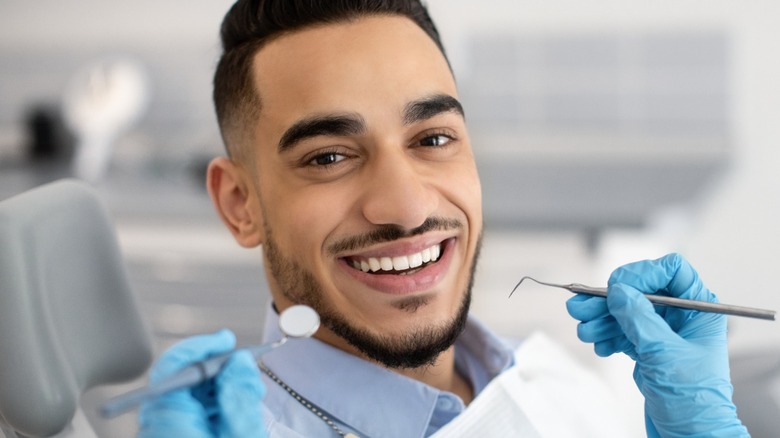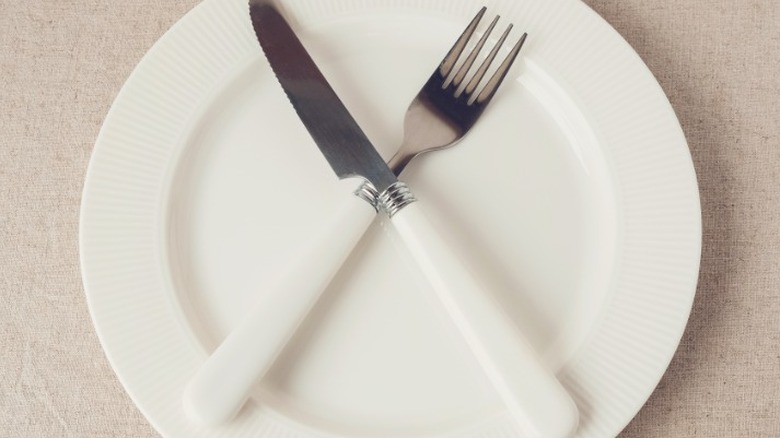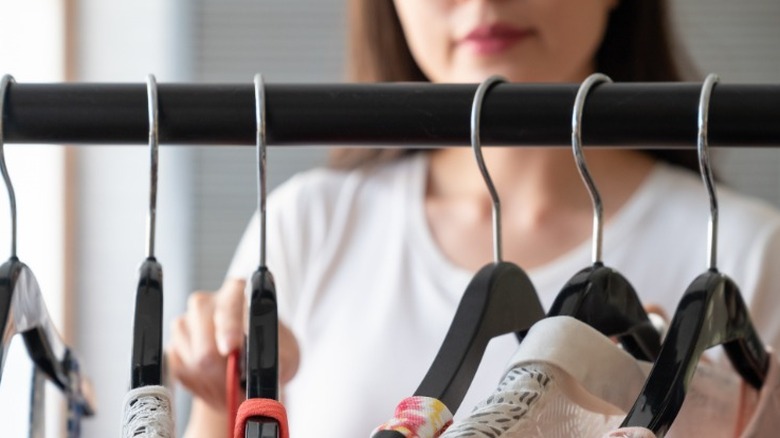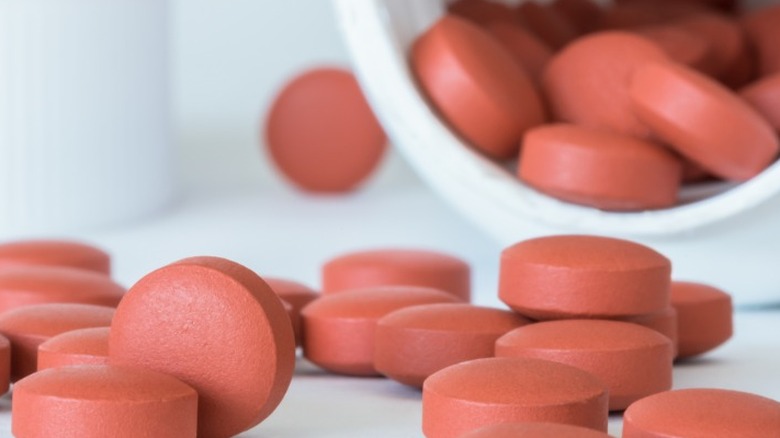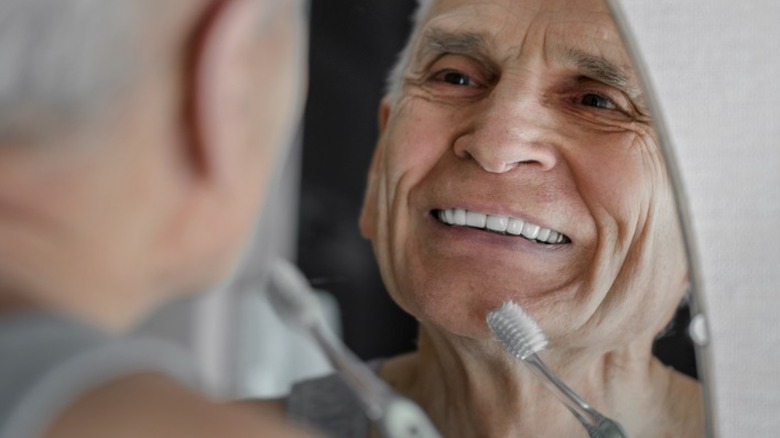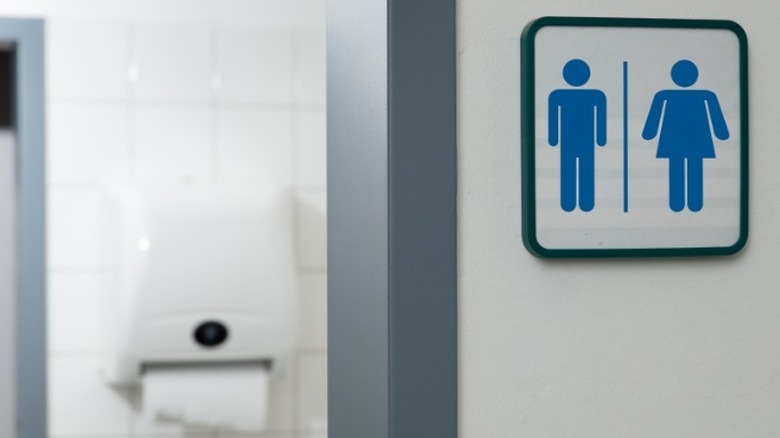Make Sure You're Doing These Things Before Going To A Dentist Appointment
Staying on top of your dental health is an essential part of your overall well-being. Research has shown that poor oral health may lead to an increase in harmful bacteria in the mouth that can enter the digestive tract and airways, eventually making their way into your bloodstream (per Mayo Clinic). When your teeth and gums are not as healthy as they could be, it can increase the risk of developing cardiovascular disease, respiratory disease, and pregnancy complications.
One way to keep your teeth healthy and avoid some of these complications is to visit your dentist regularly. The American Dental Association (ADA) shares that regular dental appointments help catch issues early when treatment is typically easier and prevent future problems from developing. While most dentists recommend a full exam and teeth cleaning every six months, you may need to go more often if you have dental issues.
When getting ready for your dental visits, you may wonder if there are things you should do to make the most of your time with your dentist. It turns out there are several ways to prepare that will make your dental appointment go more smoothly.
Have personal information ready to go
There's usually some paperwork involved in a dental appointment, whether you are a new patient or not. Much like a doctor's appointment, the administrative team at your dental office will need to verify some personal information and insurance details before you see your dentist.
For new patients, the paperwork will probably be a little more extensive. According to Imagine Dental, people attending their first dental appointment at a new office will need to complete forms related to medical history, allergies, current medication, and any family-related dental issues. You should also have information about your dental insurance ready to go, including your insurance card or claim forms if you have to submit a claim for reimbursement.
If you were referred to a dental specialist, you might also need to bring your referral letter or documents to your appointment if that wasn't sent over directly. Additionally, you should double-check that your dental records, including your latest dental x-rays, were sent to your new dentist prior to your appointment. This will help speed up the process and save you from having to delay treatments or procedures.
Know what your insurance covers
In the days leading up to your dental visit, it's a good time to review your dental insurance policy to get a better idea of what services are covered. Even with the best dental insurance, there are different procedures that may only be partially covered or not covered at all. Although your insurance will fully cover dental cleanings, it may not pay for cosmetic dentistry services or orthodontic care. Going into your appointment with full knowledge of your policy can help you avoid costly treatments that aren't medically necessary.
The type of dental plan you have will determine how much you have to pay out of pocket for any service. For example, a direct reimbursement program will typically pay a percentage of the cost of dental care, regardless of what type of treatment you get (via WebMD). Preferred provider organization (PPO) plans may give you more freedom to choose your dentist or specialist, while a dental health maintenance organization (HMO) plan limits you to in-network providers.
No matter what type of dental insurance you have, know what your plan requires for co-pays, deductibles, and no-essential dental services ahead of time to avoid being caught off guard when money is tight.
Write down questions or concerns
Between dental visits, you might notice some changes to your teeth and gums. Maybe your teeth feel more sensitive, or you experience pain when you chew on one side of your mouth. You may also have concerns about the look of your smile and want to know what your dentist can do about teeth staining or misalignments. If you're struggling to keep your teeth plaque-free at home, you might want to get your dentist's opinion on the best products or techniques.
Whatever your questions might be, it's a good idea to write them down and have them ready to go for your next appointment. Dental office visits can be nerve-wracking or stressful for some people, making it difficult to remember everything while you're in the exam chair. Even making simple notes on your phone whenever you think of something you want to ask can help jog your memory when you see your dentist.
If you don't have any specific concerns to discuss with your dentist or dental hygienist, you can still take advantage of their knowledge and expertise. Colgate shares some good questions to ask your dentist, including how to prevent tooth decay and gum disease, when your kids should start seeing the dentist, and how to improve your smile's appearance.
Avoid certain foods
For people who have a dental appointment coming up, it's probably a good idea to avoid certain foods that can damage tooth enamel and increase sensitivity. Tooth enamel is the protective outer layer of the teeth that shields the dentin and tooth pulp from erosion, decay, infections, and painful tooth sensitivity. In fact, tooth enamel is the hardest substance in the human body (per Cleveland Clinic).
Unfortunately, some food and beverages can wreak havoc on tooth enamel, causing it to wear away and expose the sensitive layers of the tooth underneath. According to the American Dental Association, acidic and sugary foods and drinks are highly erosive and can cause irreversible damage to tooth enamel. Some of the worst things you can consume when it comes to your dental health include candy, soda, coffee, wine, carbonated beverages, and citrus.
Skipping harmful foods and drinks can help to keep your tooth enamel strong and your teeth less sensitive. That way, you won't experience as much discomfort during cleanings or other treatments. You'll also get a good report from your dentist and avoid costly or extensive procedures.
Eat a healthy meal if allowed
If you're getting dental work done, it's possible that you won't be able to eat for several hours after your appointment. Certain procedures, including tooth fillings and root canals, require anesthetic to be injected into the area of the mouth where your dentist will be working. It's usually difficult and even risky to eat when your mouth, lips, and tongue are still numb.
If your anesthesia hasn't worn off yet, you could bite your tongue or the insides of your cheeks while chewing and cause injuries without even knowing it. Also, certain dental services simply take a long time, which can seem even longer if you haven't had a substantial meal in a while. Some patients experience nausea while having a dental procedure done, and an empty stomach can actually make nausea worse in some cases. A quick meal can help counteract that sick feeling.
Because it could be a long time before you can grab a bite, you should plan on having a healthy meal before you arrive at your dentist's office. Eat something that has a good amount of protein, which will keep you feeling fuller for longer (per Healthline). Just be sure to check with your dentist to see if it's okay to eat before your appointment.
Follow dietary restrictions before dental surgery
While it's sometimes good to have a meal before seeing your dentist, people who are having dental surgery may be asked to refrain from eating. If your surgery includes sedation, it's possible that pre-surgery instructions will involve fasting before the procedure to prevent complications.
As explained by Renown Health, some types of anesthesia or surgical sedatives will cause food, liquids, or acids in the stomach to enter the lungs and cause aspiration. General anesthesia relaxes the muscles in your stomach and throat, which makes it easier for the contents of your stomach to move back up through the esophagus and into your lungs. According to an article in Cereus, fasting for at least six hours before a procedure is generally enough time for most patients to empty their stomachs.
If you fail to follow the fasting instructions given to you by your dentist before oral surgery, it's crucial to be honest with your healthcare providers. Putting you under general anesthesia with food or liquids in your stomach can affect your breathing and put you at risk of choking (per WebMD).
Wear something comfortable
Sitting in a dental chair with several people staring into your mouth is awkward enough without having to deal with uncomfortable clothing. Choosing clothes that are too tight or bunched up will leave you fidgeting in the chair or feeling like you need to move when your dentist needs you to stay still. Also, wearing a short skirt or dress can be tricky when you're lying almost inverted during an exam or treatment.
In addition to feeling uncomfortable, there's a chance you may get water or other materials on your clothing while the procedure is taking place. You don't want to risk damaging expensive items or your favorite work shirt during a dental visit. Skipping these outfits can also save you a wardrobe change before heading to work or an event after your appointment.
Your best bet is to dress comfortably and casually before your dental appointment. Pants are typically a good choice, along with comfortable close-toed shoes. If it's cold outside, wear a jacket or sweater you can easily remove. And for dental patients with long hair, wear your hair in a way that allows you to lay your head flat against the chair.
Arrange for transportation if you won't be able to drive
Another important step to take prior to oral surgery or a more lengthy dental procedure is to consider transportation needs. If you're going to be sedated with general anesthesia, it's unlikely that you'll be able to drive yourself home. Anesthesia makes most patients feel groggy, tired, and disoriented for a few hours after waking up, which is why you're instructed not to drive or operate machinery for a while (per Healthline).
Prepare for your appointment by making arrangements for someone to drive you to and from the dental office. Let them know how long the procedure will be and where they need to be to pick you up. Some oral surgery offices require designated drivers to check in and present their identification to the staff before patients can be released.
Additionally, some dental patients experience intense anxiety or fear when needing to see their dentist. In these cases, it may be better for anxious individuals to have somebody drive them and provide support during their procedure. Take that into account when getting ready for an upcoming dental visit.
Try relaxation techniques if you feel anxious
Dental phobias are common and sometimes keep people from getting the dental care they need. Dentophobia, which is being unreasonably afraid of dentists, often involves crippling fear, anxiety, and stress. According to Cleveland Clinic, over a third of Americans "have a fear of dental treatment," with 12% of the population reporting "extreme fear." This fear can be very specific, too. For example, some people are triggered by needles, the thought of having things put in their mouth, anesthesia, or the sounds of dental tools.
If you fall into those categories, having to get dental work done is more than just an inconvenience. It can cause shortness of breath, chills, excessive sweating, rapid heartbeat, or nausea. It can even send some people into a full panic attack.
Rather than skipping an essential procedure, it may help to mentally prepare yourself in the weeks before your dental appointment. Your dentist or other healthcare professionals may recommend some relaxation techniques to help you feel less anxious, including meditation, breathing exercises, or visualization (per Mayo Clinic).
Ask your dentist about ibuprofen for sensitive teeth
If you have particularly sensitive teeth or gums, even routine procedures like dental cleanings can be uncomfortable. Because tooth cleanings involve the use of special dental tools that pick and chip away at tartar and plaque buildup, those with tooth sensitivity may experience aching or soreness during and after the procedure. Fortunately, taking painkillers before a cleaning may help dull the pain and get you through the treatment.
A review published in Annali Di Stomatologia found that using ibuprofen, in particular, to preemptively treat dental pain was effective. It also shared that ibuprofen can be useful in conjunction with anesthesia by increasing pain relief more than other types of painkillers, including acetaminophen-codeine.
Before your appointment, it may be worth asking your dentist if taking over-the-counter ibuprofen prior to your procedure is a good choice for you. Gentle Dental shares that 600 to 800 milligrams of ibuprofen can help with dental pain and inflammation if taken an hour before a routine cleaning. However, it may not be appropriate to take ibuprofen before other types of treatments that involve pinpointing where the pain is coming from or describing the pain to your dentist.
Brush, floss, and rinse with mouthwash
It's always good etiquette to clean your mouth before a dental visit. Not only does this remove any food debris and buildup, but it also freshens your breath before your dentist and hygienist examine your teeth. Take the time to properly brush and floss your teeth and rinse your mouth with mouthwash before you head out to your appointment.
As described by Colgate, the correct way to brush your teeth includes holding a soft-bristled toothbrush at a 45-degree angle near the gumline and brushing back and forth on the outside and inside of the teeth. Move your brush over the back molars to remove harmful bacteria and food particles that may have become lodged in the crevices. Then, use dental floss to clean the hard-to-reach areas between the teeth and just under the gumline.
However, be sure not to brush too hard or overdo it to try and make up for not taking care of your teeth between dental visits. Your dentist will be able to tell if you've kept up with your dental hygiene with a quick exam. Also, brushing too hard can damage tooth enamel and cause your teeth to be more sensitive during your appointment.
Use the bathroom
With your focus on getting through your appointment as quickly as possible, it's easy to forget to use the restroom prior to sitting in the dental chair. However, it can be disruptive during a procedure if you have to get up and go to the bathroom. Depending on your appointment time, your morning cup of coffee or afternoon smoothie could kick in right in the middle of your dental cleaning or other dental treatment.
To add to that, some dental services can take a long time. Although routine procedures only take about 20 to 30 minutes to complete, you may find yourself sitting in the dental chair for hours if you need a root canal, tooth extraction, dental implant, or other extensive treatment. Even if you don't feel like you have to use the restroom prior to the procedure, you should consider going to avoid feeling uncomfortable or asking the dentist to pause the treatment.
Arrive early
When you know you have a dentist appointment coming up, leave time in your schedule to get there early if you can. Arriving 10 to 15 minutes early for your dental visit gives you enough time to fill out important paperwork, update information, set up your next appointment, or even see your dentist before your scheduled time.
You may also feel less rushed or stressed if you give yourself plenty of time to get to your appointment. If you happen to feel anxious or nervous about your dental visit, a few extra minutes can make a big difference. Knowing that you don't have to rush into the office and immediately jump in the dental chair can help you prepare for what's to come in the waiting area.
Likewise, if you need to get back to work or school after the appointment, you should ask the staff how long they expect the procedure to take when you confirm your dental visit. Then, add some extra time to that to allow for delays or other issues that may come up. This way, you'll also have an idea of when you can expect to return and not feel rushed to get back.

